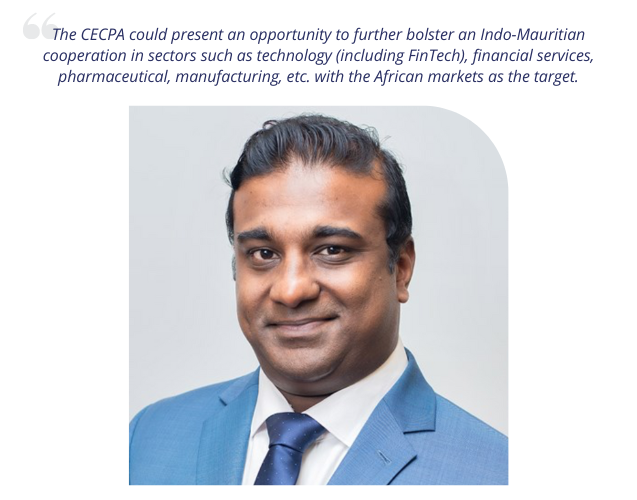With the rising interest of Indian entrepreneurs, multinationals and private funds, tapping into the growth of the African continent, the signature of the Comprehensive Economic Cooperation and Partnership Agreement (CECPA) opens up a new era of opportunities for the Mauritius IFC to intermediate the flow by acting as a hub boosting a triangular cooperation between India, Mauritius, and African countries, says Varounen Goinden, Director, Head of Business Development, Mauritius & India at Sanne.

The recent report by Capital Economics mentions that the overall stock of foreign investment mediated through Mauritius amounts to USD 560 billion (bn), of which half is located in India. Meanwhile, a large part of the discussion around the CECPA is centred around how the agreement positions India and Mauritius jointly to partake of a unique strategic opportunity to explore new horizons and strengthen regional commercial ties in the Indian Ocean region and mainland Africa. How do you see this working, and what could be some challenges that could come in the way of making the most of this exciting opportunity, especially for the financial services sector?
Since the early days of economic liberalisation in India, over 30 years ago, Mauritius has established itself as a leading financial centre funnelling funds across the globe into India. This has contributed to catapult India as one of the fastest growing economies globally, as well as helping the Mauritius International Financial Centre (“MIFC”) to build a solid ecosystem as a global financial centre.
With the rising interest of Indian entrepreneurs, multinationals and private funds, tapping into the growth of the African continent, the signature of the CECPA opens up a new era of opportunities for the MIFC to intermediate the flow by acting as a hub boosting a triangular cooperation between India, Mauritius, and African countries.
The MIFC boasts excellent credentials on both fronts; three decades of experience as a leading financial centre for the Indian markets, as well as a prominent hub for Africa-centric investments through its strong regional and bilateral economic ties and multi-lingual capabilities, combined with a strong conducive financial ecosystem.
In addition to the geographic proximity with the African continent, Mauritius has built close ties with its fellow African countries both bilaterally and regionally through membership in the African Union, the Southern African Development Community (SADC) and the Common Market for Eastern and Southern Africa (COMESA). The CECPA could present an opportunity to further bolster an Indo-Mauritian cooperation in sectors such as technology (including FinTech), financial services, pharmaceutical, manufacturing, etc. with the African markets as the target.
The report by Capital Economics also estimates that Africa shall require at least USD 700 bn to meet its Sustainable Development Goals (SDGs) by 2030. With at least half of this expected to come in from private investors, how do you see Mauritius playing a role in this fund mobilisation?
The MIFC has transformed itself over the past three decades as a platform of choice for global investors accessing emerging markets across Asia and Africa. The recipe of this success was built upon the creation of a safe and trusted ecosystem which provided investors the necessary confidence and trust to penetrate markets which presented a unique set of challenges. Through this unique configuration, the MIFC has positioned itself as a leading node for fund mobilisation for DFIs, global LPs and multinationals willing to invest in Africa.
The value proposition of the MIFC has been centred around providing a business-friendly environment through a favourable tax regime, ease of doing business, free flow of foreign exchange, strong legal and regulatory system as well as risk management and mitigation through Investment Promotion and Protection Agreements (“IPPAs”), amongst others. Moreover, the MIFC has been able to attract, train and nurture a large pool of talents and build a world-class ecosystem through a network of global banks, lawyers and investment managers.
The road towards the 2030 Africa SDGs has unexpectedly been rocked by the recent pandemic, and investors will more than ever require the support of a solid foundation to pursue their investment agenda over Africa.
Building up on its success story, the MIFC would undoubtedly remain an essential component of the African growth story by ceaselessly upgrading its product scope, regulatory environment, infrastructure and human capital to provide a sophisticated, safe and conducive ecosystem for fund mobilisation and onward investment throughout the continent.
Your Country Head mentioned in a recent interview with AVCA that Sanne is strategically positioned through its 23 global offices to act as a servicing platform for Africa-centric managers and investors willing to reach the continent. Could you elaborate on this, and how your African credentials are further enhanced via your presence in two of the largest African IFCs – here in Mauritius and beyond in South Africa?
Sanne is present in 8 out of the 10 top investor economies by FDI stock into Africa (as per the World Investment Report 2021 published by UNCTAD) – this includes Mauritius and South Africa. Through this extended presence, Sanne can offer a single platform substantially throughout the investment value chain (investor countries as well as structuring countries) while simultaneously leveraging on the great experience, network and capabilities built by the Mauritius and South African offices throughout the African continent. GPs and LPs benefit from the synergies created through this platform from a communication, data management, technology, financial accounting and reporting perspective, amongst others.
Taking forward the discussion on African SDG realisation into a broader discourse on ESG and its importance to the private equity space, could we have your thoughts on how and why ESG investing is becoming more and more entrenched in the private investment landscape?
The need on the continent of Africa is such that purely by investing in Africa, you are already making an impact. Private investment creates jobs, grows the economies by offering products and services and pays taxes that then support government plans. Some of the sustainable development goals (SDGs) where the UN and private investments have made significant impacts in Africa centre around reducing poverty, alleviating hunger, improving health and increasing education. In the past the positive impacts experienced appeared to be accidental and not purposely pursued. The trend is moving towards ESG investing where there is a specific list of targeted impacts before investment and then regular reporting showing progress towards those impacts. Investors want to know how much of an impact their capital is making and if that impact is growing over time.
Could you specifically address the key role that regulation is playing in making ESG investing an integral aspect of the private investment landscape today? As an area of focus, we would like your thoughts on how Africa is evolving in the regulatory space, and how it can inspire itself with global regulatory developments in the impact investing arena.
The EU SFDR regulation entered into force in 2021 and is expected to set the tone from a regulatory perspective. Private investment funds investing in Africa but marketing to EU investors will also be in the scope of the EU regulations and must make several disclosures around ESG. Other jurisdictions are following suit and bringing out their own regulations, codes or guides. We are expecting that these regulations will set the standard for ESG reporting and for discussions with investment managers in 2022 to centre around data gathering and data quality with ESG reporting really taking off towards the end of 2022 and 2023.
Finally, with both ESG investing and FinTech developments having accelerated amid the COVID-19 pandemic, could you comment on how the private equity space is leveraging technology and digital, with focus on Africa?
The economic disruption of the pandemic caused a slowdown in Private Equity activity across Africa. However, this did not really impact the FinTech sector which continuously attracted private equity investments in 2021 and is likely to persist in 2022. Just in 2021, four African FinTech companies reached billion-dollar valuations. These companies, known as unicorns, are from Nigeria and Egypt, two regions that are increasingly receiving funding from private equity and venture capitalists.
Africa is a great choice for FinTech investors with its large unbanked population of increasingly mobile and tech savvy people. It has huge potential for tech start-ups and we have seen a swarm of digital financial services providers that have emerged which give individuals access to financial products and services they initially could not tap into, and all this while still retaining the traditional banking clients.
As Africa continues to develop its FinTech space, we are confident that the continent will keep on attracting funding and this, as mentioned above, will not only help the continent emerge financially and economically but will also lead to multiple social benefits for the African population.
